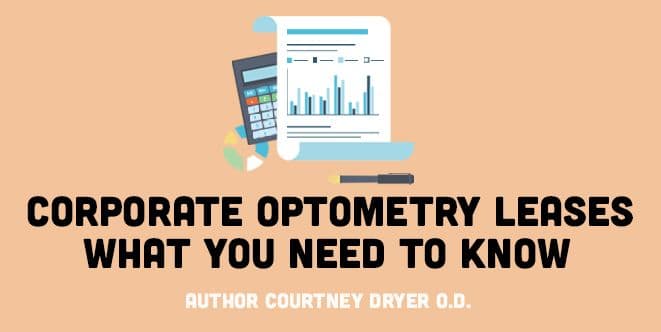Here are some important things to consider before signing a corporate optometry lease.
When you are a new graduate, your experience is limited, and you may not be sure of what to ask before accepting a new job, be it corporate optometry or private practice. Add nerves to the mix, and you may walk away from a job interview with unanswered questions. Armed with the following information, we hope you will be more confident that the job you accept is the job you expect and want.
1. Questions to consider when interviewing with a corporate optometry lease manager or employer OD
Scheduling:
- Who is responsible for scheduling your appointments in a corporate optometry lease? Is the scheduling system in real time? (Real time means actively updated as patients schedule, important to ensure no double booking)
- Do you have the ability to set your appointment schedule?
- How many hours a week are you committing to your specific corporate optometry lease?
- How many patients are typically on the books per week currently?
- Are hours extended for the end of year rush?
- What are their policies on RX checks?
Payments:
- If a 1-Door State, are you paid retroactively after insurance payments come in?
- Will you collect exam fees only in your particular corporate optometry lease?
- Percentage of non-insured patients vs. insured patients?
Staff:
- How many employees do they provide you with?
- How are their roles defined?
Equipment:
- What equipment is provided for you when you arrive day one in your corporate optometry lease?
- Are you provided with computers? Capable of EMR use?
Marketing:
- Are you responsible for marketing your practice? (i.e., Dr. Dryer interviewed once with Sears, and they wanted her to create her website)
- If you are, will your corporate optometry lease provide you with any money?
2. Things to consider before signing a corporate optometry lease
- Does it have a non-compete clause? (Note: This is important in both private/corporate optometry)
- If it does contain a non-compete clause, is it reasonable? Some contracts can be >5 miles which can be more limiting in small town vs. city
- What are the conditions for contract release if you want out? If they want, you out? Some days? Penalties?
- Will you have enough patients to produce enough income?
- What holidays will you be obligated to work?
- Can you negotiate to receive contact lens materials benefits?
- Will you need to find a fill-in doctor if you are unable to work? The amount paid to fill-in doctor?
- Does it further your career goals?
Have you reviewed your contract with a lawyer?
3. Documentation to have in place for a corporate optometry lease
- Do you need to form an organization i.e.,. sole proprietorship, PLLC?
- Have you registered for a Tax ID number?
- Have you credentialed for insurance panels? If not, how long until you can file insurance claims?
Have you acquired malpractice, disability, and health insurance?
